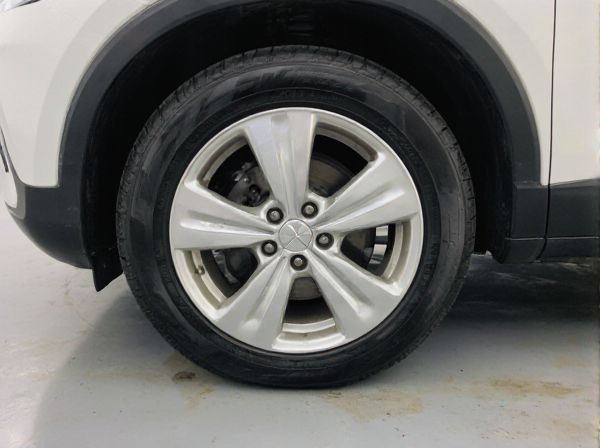
Photo illustration: Whitewall vs Blackwall
Whitewall tires offer a classic, vintage aesthetic that enhances the look of traditional cars and motorcycles, while blackwall tires provide a sleek, modern appearance favored for performance and durability. Your choice depends on the style you want to emphasize and the vehicle's intended use, as whitewalls often require more maintenance to keep clean compared to blackwalls. Both types deliver reliable traction and safety, but blackwalls tend to be more versatile for everyday driving conditions.
Table of Comparison
| Feature | Whitewall Tires | Blackwall Tires |
|---|---|---|
| Appearance | Classic, vintage look with white sidewall stripe | Sleek, modern, all-black sidewall |
| Maintenance | Requires frequent cleaning to keep whitewall bright | Low maintenance, hides dirt and scuffs better |
| Cost | Typically higher due to design complexity | Generally more affordable and widely available |
| Durability | Whitewalls may discolor or fade over time | Durable with consistent appearance |
| Popularity | Popular in vintage, classic car communities | Common choice for modern vehicles |
| Compatibility | Best suited for classic or show cars | Compatible with all vehicle types and styles |
Introduction to Whitewall and Blackwall
Whitewall and Blackwall refer to distinct styles of tire sidewalls that impact both aesthetics and functionality in vehicles. Whitewall tires feature a prominent white rubber stripe or entire sidewall, historically popular in classic cars and vintage designs, symbolizing elegance and retro appeal. Blackwall tires, characterized by their entirely black sidewalls, offer a modern, sleek appearance and are commonly used for performance and everyday vehicles due to their minimal maintenance and durability.
Historical Evolution of Tire Wall Colors
Whitewall tires originated in the early 1900s when manufacturers used natural white rubber on the sidewalls for aesthetic appeal and durability, while the tread remained black due to carbon black additives enhancing wear resistance. Blackwall tires emerged as a more cost-effective and practical alternative in the mid-20th century, offering easier maintenance and a sleek, modern look as automotive styles evolved. Over time, the contrast between whitewalls and blackwalls reflected broader trends in automotive design, shifting from classic luxury to contemporary simplicity.
Key Features of Whitewall Tires
Whitewall tires feature distinct white rubber sidewalls that provide a classic, vintage aesthetic widely favored in custom car and classic car communities. These tires are made using a specific manufacturing process where the white rubber is bonded to the tire's sidewall, ensuring durability and resistance to discoloration. Known for their stylish appearance, whitewall tires also maintain the performance characteristics of standard blackwall tires, offering reliable traction and ride comfort.
Distinct Characteristics of Blackwall Tires
Blackwall tires are characterized by their all-black sidewalls, which provide a sleek, understated look preferred for performance and everyday vehicles. Unlike whitewall tires, which feature a white stripe or entire white side, blackwall tires offer increased resistance to scuffing and dirt visibility, making them easier to maintain. Their design enhances the tire's durability and provides superior traction and handling on various road conditions.
Aesthetic Impact: Classic vs. Modern Look
Whitewall tires create a classic, vintage aesthetic that enhances the nostalgic appeal of classic cars and retro designs, adding a touch of elegance and timeless style. Blackwall tires offer a modern, sleek appearance that complements contemporary vehicles, emphasizing minimalism and a clean, aggressive look. The choice between whitewall and blackwall tires significantly influences the vehicle's overall visual impression, aligning with either traditional charm or modern sophistication.
Performance Differences: Whitewall vs. Blackwall
Whitewall tires typically have a thicker sidewall which can result in a softer ride but potentially less precise handling compared to blackwall tires. Blackwall tires often feature advanced rubber compounds and reinforced sidewalls that enhance cornering stability and overall grip. Performance-focused vehicles benefit from blackwall tires due to their improved responsiveness and traction under high-stress driving conditions.
Maintenance and Longevity Comparison
Whitewall tires require more frequent cleaning and maintenance to keep their bright appearance, as dirt and scuffs are more visible against the white surface. Blackwall tires generally have a longer lifespan due to less visible wear and easier upkeep, making them a practical choice for drivers prioritizing durability. Regular inspection and proper tire rotation can extend the longevity of both tire types, but blackwall tires tend to retain an aesthetically pleasing look with less effort over time.
Cost Analysis: Which Is More Affordable?
Whitewall tires typically cost 10-20% more than blackwall tires due to their specialized manufacturing process and aesthetic appeal. Blackwall tires offer a more budget-friendly option, with prices influenced by tire size, brand, and performance ratings, generally making them the more affordable choice for everyday use. When factoring in maintenance and longevity, blackwall tires may also incur lower upkeep costs, reinforcing their cost-effectiveness compared to whitewall tires.
Popularity and Market Trends
Whitewall tires have seen a resurgence in popularity due to their classic aesthetic appeal, especially among vintage car enthusiasts and custom car builders. Blackwall tires dominate the market with their modern look and superior performance features, making them the preferred choice for everyday drivers and high-performance vehicles. Market trends indicate a steady demand for blackwall tires driven by advancements in tire technology, while whitewall tires maintain a niche yet stable presence fueled by retro and collector car markets.
Choosing the Right Tire Wall for Your Vehicle
Whitewall tires offer a classic, vintage aesthetic popular among collectors and restorers, enhancing the visual appeal of classic cars. Blackwall tires provide a sleek, modern look favored for everyday vehicles, offering better resistance to dirt and easier maintenance. Selecting the right tire wall depends on your vehicle's style, usage, and maintenance preferences, balancing aesthetics with practicality.
 caratoz.com
caratoz.com